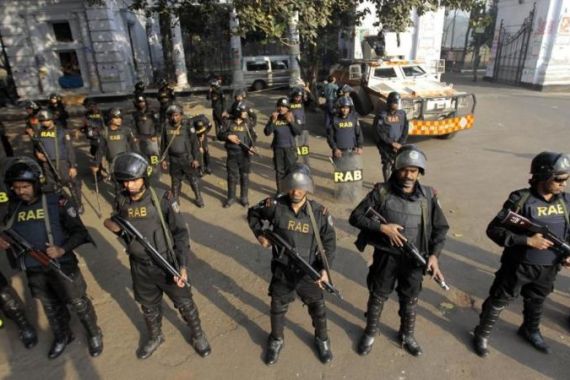Bangladesh tribunal indicts UK Muslim leader
Bangladesh-born Chowdhury Mueen-Uddin indicted for crimes against humanity and genocide during 1971 liberation war.

Bangladesh’s war crimes court has indicted a Bangladesh-born British Muslim leader for his alleged role in the murder of top intellectuals during the country’s 1971 liberation war.
“The court has taken into cognisance the charges of war crimes against Chowdhury Mueen-Uddin and issued a warrant to arrest him,” International Crimes Tribunal registrar Nasiruddin Mahmud told the AFP news agency on Thursday.
State prosecutor Syed Haider Ali told AFP that Mueen-Uddin “has been indicted for crimes against humanity and genocide. The charges include the killing of the country’s top intellectuals during the 1971 war of liberation”.
The country’s International Crimes Tribunal has already charged 12 people with war crimes and sentenced to death two people, including the vice-president of the largest Islamic party, Jamaat-e-Islami.
The court also indicted Ashrafuzzaman Khan, a US citizen, on the same charges.
Mueen-Uddin has held senior positions in a host of Islamic organisations in the UK and was involved in the setting up of the Muslim Council of Britain, according to his website.
Al Jazeera’s Nicolas Haque, reporting from Bangladesh, said that Mueen-Uddin was a “prominent figure in the British-Bangladeshi community”,
“Prosecutors of the Bangladesh war crimes tribunal believe he helped Pakistani forces organise targeted killings during the 1971 liberation war Bangladesh fought with Pakistan,” he said.
Rejects allegations
Toby Cadman, Mueen-Uddin’s lawyer, told Al Jazeera that he learned of charges of against his client in through the media.
“I would like to make it clear that none of these allegations have ever been formally put to Mr. Mueen-Uddin. There has been no attempt to question Mr Mueen-Uddin or to formally put the allegations to him,” he said.
Mueen-Uddin “rejects all these allegations in their entirety. The statements made by members of the Government of Bangladesh are grossly defamatory to my client, wholly untrue and are refuted in their entirety.”
Haque said it was unlikely Mueen-Uddin would face trial in Dhaka due to the fact that because Bangladesh has the death penalty there is no extradition agreement between the two countries.
Bangladesh, which was called East Pakistan until 1971, has struggled to come to terms with its violent birth.
The current government says up to three million people were killed in the war, many murdered by locals who collaborated with Pakistani forces.
Prime Minister Sheikh Hasina’s government established the tribunal in March 2010 to try the collaborators, but it has been hit by a series of controversies.
A presiding judge resigned in December last year after his leaked internet calls showed he was under pressure from the government to deliver a quick judgement.